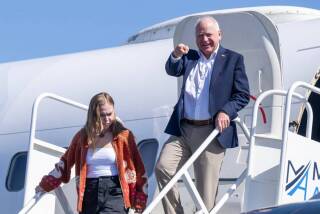Brown Softens Stance on Clinton After Defeats : Democrats: Former governor, back in California, says he will support party nominee, without conditions.
- Share via
Former Gov. Edmund G. (Jerry) Brown Jr.--his campaign for the White House reeling from defeat--returned to California on Saturday and struck a rare conciliatory stance toward his party’s front-runner, Arkansas Gov. Bill Clinton.
In comments to reporters at the Democratic state convention in Los Angeles, Brown for the first time offered unconditional backing of the party’s nominee, who most political analysts now presume will be Clinton. Brown said he “will certainly offer my support” to the nominee; previously, he had said he would do so only under certain conditions.
And in a dramatic shift from the fiery attacks he usually directs at Clinton, Brown was careful not to criticize him in a speech to the convention. Instead, he focused on a larger theme.
The presidential campaign is “not about me. It’s not about Clinton,” Brown told some 2,000 convention delegates. “It’s about the future of our country. It’s about justice . . . .
“If it doesn’t come from this party, from where will it come?”
As Brown spoke, hundreds of supporters cheered and waved placards pledging to “Take back America.” They stormed the stage when he finished the speech inside the California Ballroom at the downtown Westin-Bonaventure Hotel.
Relieved national and state Democratic leaders, who had nervously awaited Brown’s appearance, were quick to praise the former governor’s muted tone. State Chairman Phil Angelides described Brown’s speech as a “watershed event” because it cast President Bush as the clear enemy, instead of fellow Democrats.
And national party Chairman Ronald H. Brown, who has sparred with Jerry Brown about the tenor of his campaign in the past, said he had a brief conversation with the candidate after his speech and came away convinced that personal attacks would be avoided in what remains of the campaign before the Democratic National Convention in July.
“I do see a different tone,” Ron Brown said. “We’re a lot closer to (concentrating on the November election) than we were yesterday.”
However, some cautioned that Jerry Brown remains an unpredictable force who could shift gears again, especially if he remains an active candidate through California’s June 2 primary.
U.S. Rep. Maxine Waters of Los Angeles, who served as Clinton’s representative at the convention, pointed to Brown’s tendency to change positions, tactics and moods frequently, adding that she would not yet declare the advent of a “softer” Brown.
Waters described her mission here as one of administering “reality therapy” to the Democratic Party, especially those holdouts who still support Brown despite his losses to Clinton in Tuesday’s four primaries, including New York’s. Mathematically, she pointed out, Clinton is well on his way to becoming the party’s nominee, while it is virtually impossible for Brown to accumulate the required number of delegates.
Waters accused Brown of using “empty rhetoric” and, in a press conference, she called on him to fold his campaign in the interest of party unity.
Earlier, Waters delivered a similar message to convention delegates--one that underscored the somewhat ambivalent attitude many California Democrats have toward their one-time leader.
“I know it is hard sometimes because many of us have relationships, many of us know Jerry Brown, many of us have worked with Jerry Brown,” she said. But, she added: “We’ve got to come together and make a decision; forget about friendships. What we need now is leadership. We need a leader who has demonstrated not only that he can bring us together, but that he has real ideas.”
Also at the convention, Clinton supporters announced a series of endorsements for their candidate. They included State Insurance Commissioner John Garamendi, the first statewide officeholder to announce support for the Arkansas governor.
Aside from his convention appearance Saturday, Brown toured an East Los Angeles neighborhood. He stopped frequently to hear residents describe the effects of violence, drugs and joblessness on their community. Then Brown headlined a boisterous rally at Santa Monica Airport.
Saturday night, Brown returned to the convention to introduce its dinner speaker, the Rev. Jesse Jackson. Earlier in the day, Brown offered a feisty defense of his offer to Jackson to be his running mate.
“When I said I wanted Jesse Jackson as a vice president, I know that wasn’t politically popular,” Brown said. “But I’ll tell you this, he’d be a great leader of this party and he’d be a great vice president, and I don’t care who tells me it’s not political, I’m going to stand with the poor, with the oppressed, with the trade unionists, with the environmentalists and with those who make up the essence of this party, and I’ll do it with great pride.”
The three-day convention ends today with presentations from Democratic candidates for California’s two Senate seats.
Times staff writer Melissa Healy contributed to this story.
More to Read
Get the L.A. Times Politics newsletter
Deeply reported insights into legislation, politics and policy from Sacramento, Washington and beyond. In your inbox three times per week.
You may occasionally receive promotional content from the Los Angeles Times.











